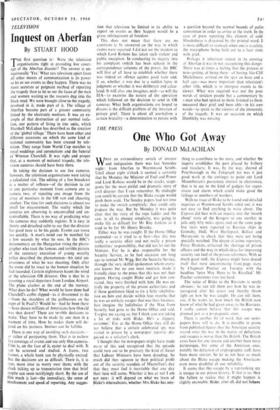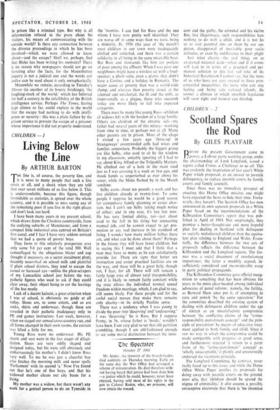One Who Got Away
THE PRESS By DONALD McLACHLAN WHAT an extraordinary switch of interest and indignation there was last Saturday night: from Aberfan to Wormwood Scrubs.
Until about eight o'clock it seemed a certainty that by Monday the Minister of Fuel and Power and Lord Robens would be in the stocks, scape- goats for the most pitiful and dramatic story of civil disaster that I can remember. By midnight you could be certain that the Blake escape would push them aside. The Sunday papers had not time to make the switch completely: they could only prepare the way. But by Monday it was quite clear that the story of the rope ladder and the saw, in all its phoney simplicity, was going to make life as difficult for Mr Roy Jenkins as it used to be for Mr Henry Brooke.
Either way he was caught. If the Home Office pretended—as it tried to at first—that this was really a security affair and not really a prison authorities' responsibility, that did not let out the Minister. For he is also responsible for the Security Service, as he had occasion not long ago to remind Mr Wigg. But the Security Service, through the very skilful spokesman whom every- one knows but no one must mention, made it brutally clear to the press that this was not their pigeon. Having caught Blake and got him con- victed, they were finished with him. He was en- tirely the property of the prison authorities; and if those gentlemen liked to try a little rehabilita- tion on him and decide within four months that he was an unlikely escaper that was their business. Just imagine the hullabaloo if the Man from Security had gone to the Home Office and said, 'Forgive me saying so, but I think you are taking a lot of risks with Blake. He's a slippery customer.' For at the Home Office they still do not believe that a certain celebrated spy was visited in prison by a newspaper reporter dis- guised as a solicitor's clerk.
I thought that the newspapers might have made more of this and recognised that the episode could turn out to be precisely the kind of fiasco that Labour Ministers have been dreading. So much did they squeeze to their political profit out of the security scandals of Macmillan's day that they must feel it inevitable that one day their turn will come. Whether it has or not I am not sure: it will depend on what we learn of Elake's whereabouts, whether Mrs Blake has any- thing to contribute to the story, and whether the inquiry establishes the part played by bribery
and treachery. It was, by the way, shrewd of
Peterborough in the Telegraph (or was it just good work at the cuttings) to point out Lord
Mountbatten's passionate interest in electronics, that is to say in the kind of gadgets for super- vision and alarm which could make good the failings or numbers of warders.
With no trace of Blake to be found and detailed inquiries at Wormwood Scrubs ruled out, it was not easy to find anything to write about. The Express did best with an inquiry into the 'month about' visits of the Krogers to one another in jails only fifty miles apart, and on the same page five visits were reported to Russian ships in Grimsby, Hull, West Hartlepool, Belfast aad Merseyside to check that they were not being specially watched. The doyen of crime reporters, Percy Hoskins, criticised the shortage of prison officers and the way in which ideas for improving security run foul of the prison reformers. With so much good stuff, the Express might have denied itself that most unconvincing front-page story by Chapman Pincher on Tuesday with the headline 'Spies May Have to be Recalled.' Mt Pincher sometimes tries too hard.
The value of Blake to the Russians is surely obvious: he can tell them just how he was in- terrogated after his arrest and thereby throw iight on how he was caught. He can tell them, too, if he wants to. how much the British now know of what he had given away to the Russians. I really cannot believe that this escape was planned just as a propaganda stunt.
There is another bit of work that our news- papers have still to do. It is possible to prove from published figures that the American security record since the war in the matter of defections and escapes is worse than the British. The British cases have for one reason and another been more picturesque, but some of the American ones, notably the defection of cryptographic staff, have been more sinister. So let us not hear so much about. the Blake escape making the Americans even more doubtful of our reliability.
It seems that this escape by a top-ranking spy is unique in our prison history. If that is so, then the failure to realise that it might happen is slightly excusable. Blake, after all, did not behave in prison like a criminal type. But why is all information refused to the press about his visitors, his means of communicating with the outside world? Is there any connection between the divorce proceedings in which he has been involved—which we were allowed to know about—and the escape? Shall we, perhaps, find that Blake has been writing his memoirs? There is no reason why newspapers should not go on ferreting after the facts, for the Mountbatten inquiry is not a judicial one and the words sub judice can be used about it only metaphorically.
Meanwhile we remain, according to Tuesday's Mirror (in another of its breezy birchings), 'the laughing-stock of the world,' which has believed for half a century in the infallibility of the British intelligence service. Perhaps The Times, having kept silence so far, could explain to the world that the escape had nothing to do with intelli- gence or security: this was a plain failure by the prison service to prevent the escape of a prisoner whose importance it did not properly understand.







































 Previous page
Previous page